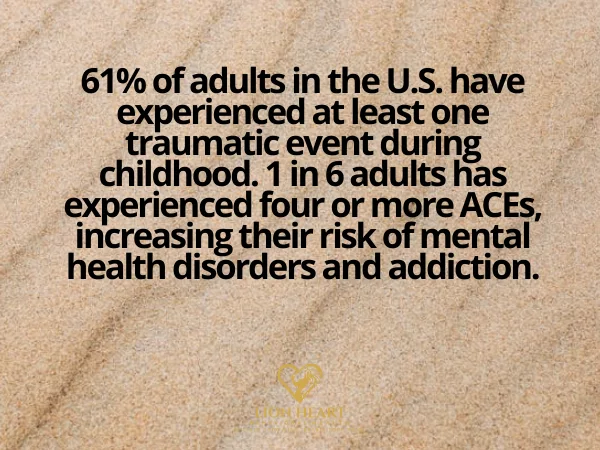Trauma is a deeply distressing or disturbing experience that can have long-term emotional, psychological, and physical effects. Whether the result of childhood abuse, neglect, violence, loss, or other traumatic events, unprocessed trauma can disrupt daily life, strain relationships, and contribute to mental health challenges such as depression, anxiety, post-traumatic stress disorder (PTSD), and addiction.
Many individuals struggle with how to process trauma in a way that fosters healing instead of leading to unhealthy coping mechanisms like substance abuse, self-isolation, or emotional suppression. At Lionheart Behavioral Health, we specialize in trauma-informed care, offering comprehensive treatment options such as our Trauma Therapy Program, Addiction Treatment Program, and Depression Therapy Program.
Whether you need an Outpatient Program, Day Treatment Program, or Night Treatment Program, our Behavioral Health Treatment Center provides evidence-based approaches to help individuals heal from past trauma and move forward in life.
This guide explores the impact of trauma, unhealthy coping mechanisms, and healthy ways to process trauma effectively, ensuring long-term emotional well-being.
Understanding Trauma and Its Impact
What is Trauma?
Trauma is an emotional response to a distressing event or series of events that overwhelm an individual’s ability to cope. Traumatic experiences can occur at any age and vary in severity.
Common Types of Trauma
- Physical, emotional, or sexual abuse
- Neglect or abandonment
- Loss of a loved one or parental separation
- Serious illness or injury
- Exposure to domestic violence
- Witnessing violence, war, or natural disasters
- Car accidents or life-threatening situations
Many people who experience trauma struggle with intrusive thoughts, flashbacks, nightmares, emotional detachment, and heightened anxiety, particularly if they do not process their experiences in a healthy way.
The Long-Term Effects of Unprocessed Trauma
Unresolved trauma does not simply disappear over time—it often manifests in various mental, emotional, and physical symptoms that can significantly impact an individual’s daily life.
Mental Health Effects
- Post-Traumatic Stress Disorder (PTSD) – Flashbacks, nightmares, emotional numbness, and heightened reactivity to stress.
- Depression – Persistent sadness, loss of interest, and feelings of hopelessness.
- Anxiety Disorders – Constant worry, panic attacks, and difficulty relaxing.
- Substance Use Disorders – Using drugs or alcohol to self-medicate trauma-related distress.
Physical Health Effects
- Chronic pain or unexplained body aches.
- Gastrointestinal issues, including irritable bowel syndrome (IBS).
- Weakened immune system and increased risk of illness.
- High blood pressure and cardiovascular problems.
Social and Behavioral Effects
- Avoidance of relationships or social interactions.
- Difficulty trusting others or maintaining stable relationships.
- Self-sabotaging behaviors or risky decision-making.
- Emotional outbursts or difficulty regulating emotions.
For those struggling with unprocessed trauma, professional intervention is often necessary to prevent these long-term effects from worsening.
Unhealthy Coping Mechanisms for Trauma
Many people attempt to manage trauma-related distress in ways that provide temporary relief but worsen symptoms over time. Recognizing these patterns is the first step toward making positive changes.
Common Unhealthy Coping Mechanisms
- Substance Use – Using drugs or alcohol to numb emotional pain.
- Emotional Suppression – Avoiding difficult emotions rather than processing them.
- Self-Harm – Engaging in harmful behaviors to cope with overwhelming emotions.
- Overworking – Using work or other activities as a distraction from painful memories.
- Social Isolation – Avoiding people or situations that may trigger trauma-related emotions.
Breaking free from these behaviors requires learning healthy ways to process trauma, which we will explore below.
Healthy Ways to Process Trauma
The good news is that trauma can be processed in a healthy way, allowing individuals to heal and regain control over their lives. Here are evidence-based strategies to help process trauma effectively:
1. Acknowledge and Validate Your Emotions
Suppressing emotions can delay healing. Instead:
- Recognize your emotions without judgment—grief, anger, sadness, and fear are natural responses to trauma.
- Journaling can help you put emotions into words, making them easier to process.
- Therapy can provide a safe space to discuss your emotions without fear of judgment.
2. Seek Professional Therapy
Therapy is one of the most effective ways to process trauma safely and constructively.
Cognitive Behavioral Therapy (CBT)
- Helps individuals recognize and change negative thought patterns related to trauma.
- Teaches practical skills for managing triggers and distress.
Dialectical Behavior Therapy (DBT)
- Focuses on emotional regulation, mindfulness, and distress tolerance.
- Helps individuals manage overwhelming emotions without engaging in harmful behaviors.
Eye Movement Desensitization and Reprocessing (EMDR)
- Uses bilateral stimulation (eye movements, tapping, or sounds) to reprocess traumatic memories.
- Helps reduce emotional distress associated with past trauma.
At Lionheart Behavioral Health, our Trauma Therapy Program offers these evidence-based treatments to ensure individuals receive personalized, trauma-informed care.
3. Engage in Physical Activity
Exercise has been shown to reduce symptoms of PTSD, depression, and anxiety by:
- Releasing endorphins (natural mood boosters).
- Regulating cortisol levels (stress hormone).
- Providing a healthy outlet for emotional energy.
Some of the best trauma-informed physical activities include:
- Yoga (combines mindfulness with movement).
- Walking or jogging (promotes mental clarity).
- Martial arts or dance (helps release built-up stress).
4. Practice Mindfulness and Meditation
Mindfulness helps individuals stay grounded in the present rather than reliving past trauma.
- Deep breathing exercises regulate the nervous system and promote relaxation.
- Grounding techniques (like the 5-4-3-2-1 method) help reduce anxiety.
- Guided meditation enhances emotional awareness and self-regulation.
5. Build a Strong Support System
Healing from trauma is easier with the right support system.
- Talk to trusted friends or family members about your experiences.
- Join a trauma support group to connect with others who understand your struggles.
- Participate in therapy groups, available through our Outpatient, Day Treatment, and Night Treatment Programs.
At Lionheart Behavioral Health, we provide individual and group therapy as part of our Trauma Therapy Program, ensuring a safe and supportive space for healing.

Seeking Professional Help for Trauma Recovery
If unresolved trauma is affecting your daily life, professional treatment can provide the tools necessary for healing.
Our Comprehensive Trauma-Informed Treatment Programs Include:
- Trauma Therapy Program – Addressing the root causes of trauma through CBT, DBT, and EMDR.
- Addiction Treatment Program – Supporting individuals who use substances to cope with trauma.
- Depression Therapy Program – Providing emotional support for trauma-related depression.
- Outpatient Program (OP) – Weekly therapy sessions for ongoing support.
- Day Treatment Program – Intensive therapy during the day while allowing individuals to return home at night.
- Night Treatment Program – Evening therapy for those balancing work or family obligations.
Each program is customized to meet individual needs, ensuring the best chance at long-term recovery.
Start Your Healing Journey Today
Processing trauma is challenging, but recovery is possible with the right support. At Lionheart Behavioral Health, we provide the expert care and guidance needed to help individuals move forward.
Reach out to Lionheart Behavioral Health to learn more about our Trauma Therapy Program, and Depression Therapy Program. Let us help you take the first step toward lasting healing and emotional well-being. Reach out to us today at (774) 228-4112 to get started.
FAQ on Healthy Ways to Process Trauma
What is trauma, and how does it affect mental health?
Trauma is an emotional response to a distressing event or series of events. It can lead to PTSD, anxiety, depression, and substance use disorders if not properly processed.
What are common unhealthy ways people cope with trauma?
Unhealthy coping mechanisms include substance abuse, emotional suppression, self-harm, avoidance, overworking, and social isolation. These may provide temporary relief but often worsen trauma-related symptoms.
What are some healthy ways to process trauma?
Healthy methods include therapy, mindfulness, physical activity, journaling, building a support system, and practicing self-care. Seeking professional help is often the most effective approach.
How does therapy help with trauma recovery?
Therapy provides structured guidance to process traumatic memories, develop emotional regulation skills, and build resilience. Effective approaches include CBT, DBT, and EMDR.
What is Cognitive Behavioral Therapy (CBT) for trauma?
CBT helps individuals reframe negative thought patterns associated with trauma, allowing them to reduce distress and improve coping mechanisms.
What is Dialectical Behavior Therapy (DBT) for trauma?
DBT focuses on emotional regulation, mindfulness, and distress tolerance, helping individuals manage overwhelming emotions without unhealthy behaviors.
What is EMDR therapy, and how does it help trauma survivors?
Eye Movement Desensitization and Reprocessing (EMDR) is a therapy that helps reprocess traumatic memories, reducing their emotional intensity and impact.
